Uzbek Silk Road Cities
A couple of days before we were due to enter Uzbekistan, Islam Karimov (the country’s only president since independence from the Soviet Union) died. The airport in Samarkand was closed, but fortunately the border stayed open and we crossed into Uzbekistan from Kyrgyzstan. It turned out to be the strictest border crossing I’ve been across, even more so than North Korea. Because of the drugs flowing out of Afghanistan, several of the Central Asian states are strict about what medication you’re allowed to bring in.
Please note that as of 2014 all medications containing tramadol, codeine, temazepam, morphine, opiates or any containing similar constituent components have been made illegal in Georgia, Azerbaijan, Turkmenistan and Uzbekistan. This includes many over-the-counter medicines that are commonly available elsewhere, such as nurofen.
The other things they were looking for were pornography, religious material and human rights material. The customs guard was nonplussed by my cpap machine (a mask I use for sleeping) but fortunately another guard explained what it was. That took up most of their attention. The guard asked me if I had any sexy videos and after that I was free to go. Many of the others in the group were subjected to more thorough searches. The customs officials logged on to people’s computers and looked at their most recently played video lists, and looked at the photos and videos on their phones.
After we crossed the border we drove into Andjian, the city where civilians were massacred in 2005. No one is sure but it’s estimated that more than 700 people were killed by government security forces. The Ferghana Valley extends across Uzbekistan and Kyrgyzstan and is known as the Restless Valley.
Imagine a region so rife with tensions and intrigue that in less than a decade it managed to produce two revolutions in the same country, murders straight out of a thriller, a massacre of unarmed civilians, a civil war, a drug-smuggling superhighway, and corruption schemes so brazen and lucrative they would be hard to invent. On top of all that, the region has served as a staging ground for the American war in Afghanistan.
Due to security requirements, camping isn’t allowed in Uzbekistan and we had to stay in hotels all the way. We also had to collect registration forms from each of the hotels to prove we had stayed where we said we were going to stay. (Although the guards didn’t check these when we left the country).
Since independence (which they gained from the Soviet Union in 1991) many of the Central Asian states have struggled with dictatorships and corruption. Uzbekistan has been described as a “society looking for identity, marooned somewhere between Mohammed and Marx.” The former president was accused of many human rights violations, but his regime was supported by the US because he allowed them to use airfields for Afghan bombing missions.
Gulnara Karimova, one of the president’s daughters was notorious for using her influence to gain lucrative contracts. She also launched a career as a pop singer under the name of Googoosha.
https://www.youtube.com/watch?v=d3HLFIx8QmU
In 2014, Karimova fell out with her father and was placed under house arrest after releasing hundreds of tweets in which she described a Shakespearean power struggle in the presidential family, accused her mother and younger sister of practising witchcraft, and lashed out at top Uzbek officials.
Arguably her greatest crime was recording a pop duet with Gerard Depardieu.
https://www.youtube.com/watch?v=N7GM2JGTswc
Uzbekistan has one of the most inconvenient currencies I’ve come across. 1 AUD is roughly 2500 Uzbek som, but the black market rate is over double that. The annoying thing is that the highest value note in circulation is the 5000, which is roughly 1 USD. Everyone ends up carrying around wads of cash. This is $100 US worth of Uzbek cash.
We stopped at many of the cities which used to lie along the silk roads – the trails from which silk flowed from China into Europe.
Samarkand was once one of the most magnificent cities in the world and the capital of Timur’s (Tamerlane) empire. Although he is appreciated for the monuments he built, Timur is also viewed as one of history’s greatest monsters. The book, The History of the Mongol Conquests argues that “Timur’s kingdom vanished with his life, and his imperialism was imbued with no purpose other than the agglomeration of sheer power built on the corpses of millions. Till the advent of Hitler, Timur stood forth in history as the supreme example of soulless and unproductive militarism.” Another estimate claims that his “military campaigns caused the deaths of 17 million people, amounting to about 5% of the world population.”
Bukhara is another of the great Silk Road cities and home to beautiful mosques and palaces.
Some of the restaurants in Uzbekistan had interesting English menus.
Uzbekistan was also the setting for the so-called Great Game, the struggle between Britain and Russia for control of the region. Peter Hopkirk’s The Great Game is the definitive book on the subject. One of the most interesting of the players of the great game was the British officer, Captain Burnaby.
Captain Frederick Gustavus Burnaby of the Royal Horse Guards was no ordinary officer. For a start he was a man of prodigious strength and stature. Standing six-foot-four in his stockinged feet, weighing fifteen stone, and possessing a forty-seven-inch chest, he was reputed to be the strongest man in the British Army. Indeed, it was even said that he could carry a small pony under his arm… He also displayed a remarkable gift for languages, being fluent in at least seven, including Russian, Turkish and Arabic. Finally he was born with an insatiable appetite for adventure which he combined with a vigorous and colorful prose style.
He wrote a book called A Ride to Khiva in which he gives advice for dealing with troublesome camel drivers and telling women that they are beautiful.
I subsequently discovered that the only way to impart a little circumspection to my careless camel driver when, after smashing my boxes, he excused himself on the ground that the Almighty had been the cause of his disaster was to administer to the delinquent a slight chastisement. This having been inflicted, I exclaimed, ‘Brother, it was the will of God. You must not complain; it was your destiny to break my property and mine to beat you. We neither of us could help it; praise be to Allah.’
This method of dealing with my party had a capital effect upon them, and much more care was afterwards taken in loading and unloading the camels…There are a good many ways of telling a woman she is pretty, but it is always difficult to do so through a third party; and the compliments which I paid her in Russian I have no doubt lost considerably in being translated into Tartar, though Nazar assured me that the expressions he selected were the most poetical with which he was acquainted. As, however, his ideas of poetry were like my guide’s, limited to songs about the beauty of a sheep, and the delights of roast mutton, I fear that when he was desired to tell her that she was the most beautiful of her sex, Nazar translated it as follows: He says ‘that thou art lovelier than a sheep with a fat tail’ – this appendage being a great delicacy amongst the Tartars – ‘that thy face is the roundest in the flock, and that thy breath is sweeter to him than many pieces of mutton roasted over bright embers.’
I climbed up the stairs of one of the towers which had a good view of Khiva’s old city. The woman selling the ticket for the tower told me – “After ten metres no lights. Watch your head. Please be careful. Good luck.”
Muhammad ibn Musa al-Khwarizmi is regarded as the father of algebra. The word algorithm comes from his name as well. He was born near Khiva and went to study in Baghdad.
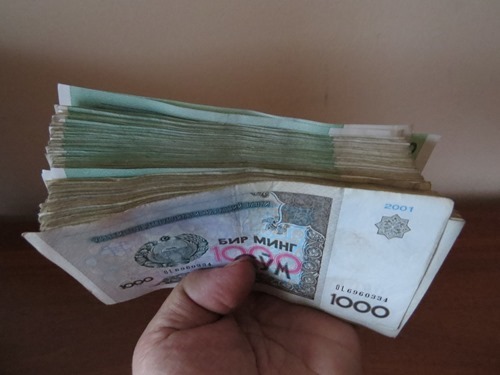
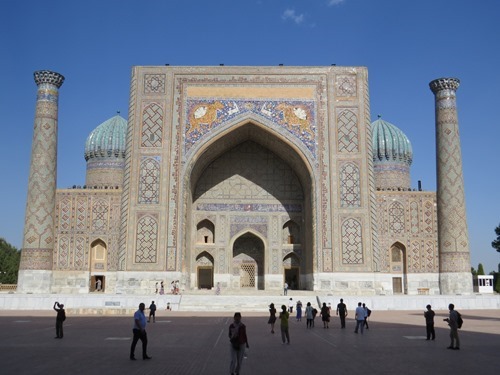
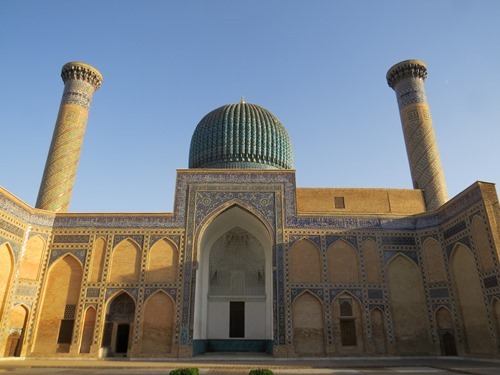
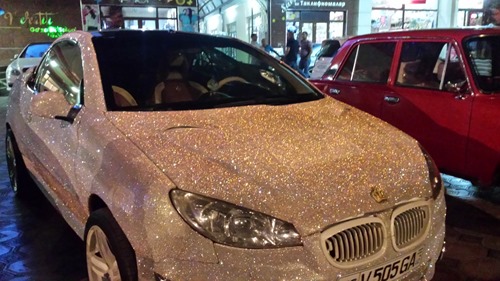
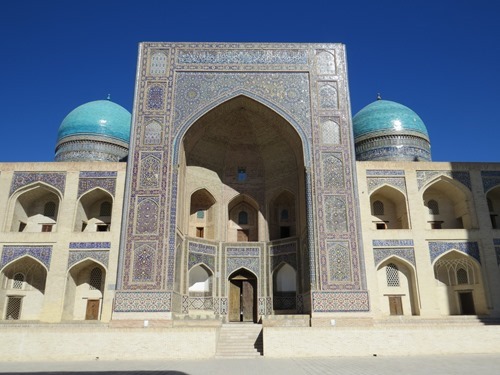
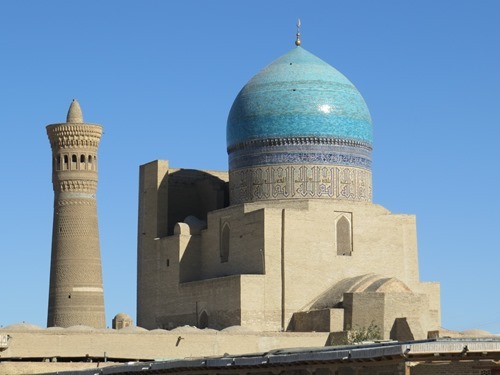
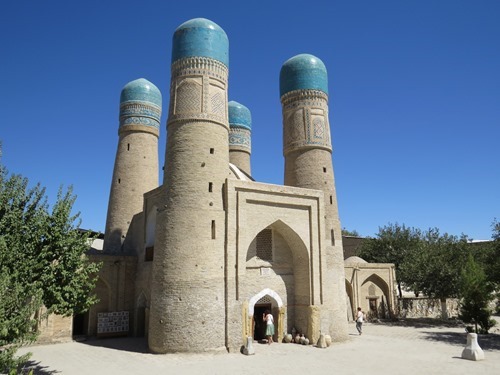

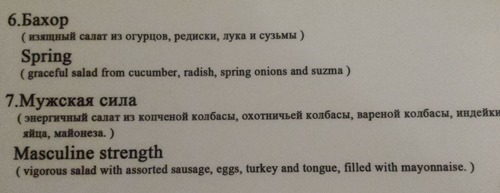
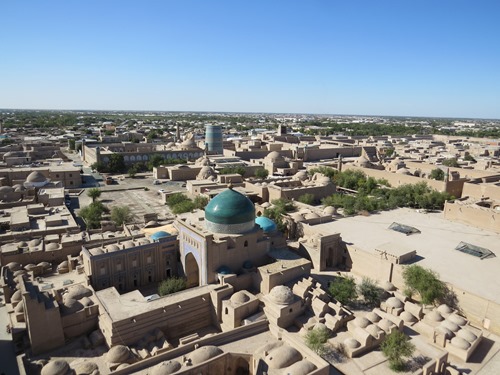
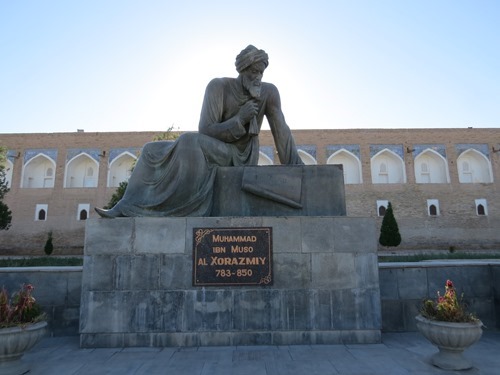
I only just read your story about uzbekistab. so interesting to read a really down to earth report on a visit to that strange country. How interesting it must have been for you to stand on a tower there and to realise that many centuries of history have passed there, completely unnoticed to us westerners.
We really know so little, and by travelling you avoid being dependent on the books of other people.
Thanks aidan for your very interesting story.
Aidan, I have finally today had an opportunity to read this account of Uzbekistan including the long lost name, Samarkand. What amazing architecture this is and how fortunate you are to have travelled to such an exotic place. Thanks for sharing, Susan
Thanks Susan. There are some wonderful buildings in the old Silk Road cities.